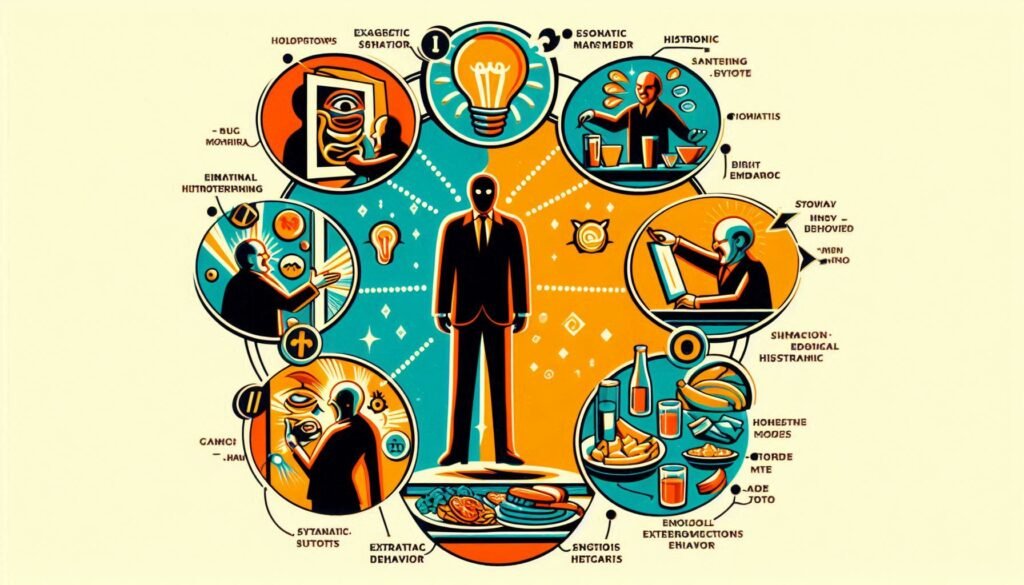Understanding Cluster B Personality Disorders is crucial for anyone seeking to navigate the complexities of emotional and impulsive behaviors. These disorders can significantly impact individuals’ lives, shaping their thoughts, feelings, and interactions with others. Whether you’re looking to learn more for personal reasons or to support a loved one, this exploration will shed light on these often-misunderstood conditions.
People affected by Cluster B Personality Disorders may display dramatic mood swings, intense emotions, and unpredictable behavior. This blog aims to unravel the intricacies of these disorders while offering insights into their characteristics, causes, treatment options, and ways we can all foster understanding in our relationships with those who live with them. Let’s dive deeper into this essential topic together!

What Are Cluster B Personality Disorders?
Cluster B Personality Disorders are a group of mental health conditions characterized by dramatic, emotional, or erratic behaviors. These disorders can lead to significant challenges in personal and professional relationships.
The Diagnostic and Statistical Manual of Mental Disorders (DSM-5) classifies these disorders into four distinct types: Borderline Personality Disorder, Narcissistic Personality Disorder, Histrionic Personality Disorder, and Antisocial Personality Disorder. Each type has its unique traits but shares common features related to emotional dysregulation.
Individuals with Cluster B disorders often struggle with understanding their emotions and may react impulsively. Their behavior can be unpredictable, leading to intense interactions that may leave others feeling overwhelmed or confused. Recognizing these patterns is the first step toward fostering empathy for those affected by such complex psychological experiences.
The Four Types of Cluster B Personality Disorders
Cluster B Personality Disorders encompass four distinct types, each characterized by unique emotional and behavioral patterns.
The first is Antisocial Personality Disorder. Individuals with this disorder often display a disregard for the rights of others. They may engage in deceitful behavior and struggle to maintain long-term relationships.
Next is Borderline Personality Disorder. People affected typically experience intense emotions and unstable relationships. Their self-image can fluctuate rapidly, leading to impulsive actions that create chaos in their lives.
Narcissistic Personality Disorder comes third. This type features an inflated sense of self-importance and a deep need for admiration. Those affected might exploit others while lacking empathy.
We have Histrionic Personality Disorder. Individuals with this disorder seek attention excessively and exhibit dramatic behaviors to gain it. Their emotional expressions can seem shallow or exaggerated, impacting their personal interactions significantly.
Common Characteristics of Cluster B Personality Disorders
Cluster B personality disorders are marked by dramatic, emotional, and erratic behaviors. Individuals often exhibit intense mood swings, ranging from extreme happiness to deep sadness in short periods.
Impulsivity is a key trait. This can manifest in reckless decision-making or engaging in risky activities without considering the consequences. Relationships tend to be tumultuous due to heightened emotions and challenges with trust.
Another common characteristic is a tendency toward manipulation or deceit. Some individuals may use charm or aggression as tools for control.
People with these disorders may also struggle with identity issues. They could have an unstable self-image that affects their interactions and choices.
These traits create complexities that impact daily life significantly, influencing work dynamics and personal relationships alike. Understanding these characteristics is essential for fostering empathy and effective treatment strategies.
Causes and Risk Factors for Cluster B Personality Disorders
The causes of Cluster B Personality Disorders are complex and multifaceted. Genetic predisposition plays a significant role, as individuals with a family history of these disorders may be at higher risk.
Environmental factors also contribute. Childhood trauma, abuse, or neglect can shape emotional responses and coping mechanisms. These early experiences often leave lasting imprints on personality development.
Additionally, social influences cannot be overlooked. Stressful life events and unstable relationships might increase vulnerability to developing these disorders later in life.
Brain structure and function may also play a part. Research suggests abnormalities in certain areas associated with impulse control and emotional regulation could heighten the likelihood of Cluster B symptoms manifesting.
Understanding these causes helps shed light on the complexities surrounding these conditions while emphasizing that multiple elements interact to influence their development.
Diagnosing Cluster B Personality Disorders
Diagnosing Cluster B Personality Disorders involves a comprehensive assessment by mental health professionals. They typically utilize standardized diagnostic tools and clinical interviews to gather information about symptoms and behaviors.
Doctors often refer to the Diagnostic and Statistical Manual of Mental Disorders (DSM-5) as a guideline. This resource outlines specific criteria that must be met for each disorder within the cluster, including borderline, narcissistic, histrionic, and antisocial personality disorders.
It’s important to consider the individual’s history and context when making a diagnosis. Clinicians look for patterns in behavior over time rather than focusing on isolated incidents.
Collaboration with other healthcare providers may also aid in accurate diagnosis. Gathering insights from family members or partners can provide additional perspective on how traits manifest in daily life.
Early diagnosis is essential for effective intervention and support strategies tailored to the individual’s needs.
Impact on Relationships and Daily Functioning
Cluster B personality disorders significantly impact relationships and daily functioning. Individuals may struggle with intense emotions, leading to unpredictable behaviors. This can create a cycle of conflict and misunderstanding in personal relationships.
Friends and family may find it challenging to navigate the emotional landscape created by someone with these disorders. Trust issues, manipulative behaviors, or frequent mood swings often erode connections over time.
Additionally, daily tasks can become overwhelming for those affected. Impulsivity may hinder work performance or lead to risky decisions that jeopardize stability. Simple routines might feel insurmountable when managing heightened emotional responses.
Social interactions often suffer as well. Fear of rejection or criticism can lead individuals to isolate themselves further, worsening feelings of loneliness and despair. Building healthy relationships becomes increasingly difficult without appropriate support strategies in place.
Treatment Approaches for Cluster B Personality Disorders
Treatment approaches for Cluster B Personality Disorders often involve a combination of psychotherapy and medication management. Tailoring treatment plans to individual needs is crucial, as symptoms can vary greatly.
Psychotherapy remains the cornerstone of treatment. Techniques such as Dialectical Behavior Therapy (DBT) are particularly effective for conditions like Borderline Personality Disorder. DBT focuses on emotional regulation and interpersonal skills.
Cognitive Behavioral Therapy (CBT) can also be beneficial, helping individuals challenge negative thought patterns that contribute to impulsive behaviors.
Medications may play a supportive role in managing specific symptoms, such as mood swings or depression. Antidepressants and mood stabilizers are commonly prescribed based on an individual’s profile.
Collaboration between healthcare providers is essential for creating a comprehensive treatment plan that addresses all aspects of the disorder while promoting overall well-being and stability in daily life.
Psychotherapy Options for Cluster B Personality Disorders
Psychotherapy plays a crucial role in treating Cluster B Personality Disorders. Various therapeutic approaches can help individuals understand their emotions and behaviors better.
Dialectical Behavior Therapy (DBT) is particularly effective for those with Borderline Personality Disorder. It focuses on mindfulness, emotional regulation, and interpersonal effectiveness. This structured approach helps manage intense emotions and reduce self-destructive behaviors.
Cognitive Behavioral Therapy (CBT) is also beneficial across the spectrum of Cluster B disorders. CBT allows individuals to identify negative thought patterns and replace them with healthier ones. This process promotes better coping mechanisms.
Schema therapy takes a deeper dive into early life experiences that shape one’s personality. By addressing these core beliefs, it aids in fostering positive change.
Group therapy can offer additional support by connecting individuals facing similar challenges. Sharing experiences fosters understanding and encourages personal growth within a safe environment.
Medication Management for Cluster B Personality Disorders
Medication management for Cluster B Personality Disorders can be complex. It often involves a combination of psychiatric medications tailored to the individual’s specific symptoms.
Antidepressants may help alleviate mood swings and anxiety. Selective serotonin reuptake inhibitors (SSRIs) are commonly prescribed for their mood-stabilizing effects.
Mood stabilizers, like lithium or anticonvulsants, can also be effective in regulating emotional volatility associated with these disorders.
In some cases, antipsychotic medications might be used to address severe symptoms such as paranoia or aggression. These drugs require careful monitoring due to potential side effects.
It’s important for individuals working with healthcare professionals to find the right balance of medication that suits their needs while minimizing adverse reactions. Regular follow-ups and open communication about changes in feelings or behaviors are vital components of successful medication management strategies.
Coping Strategies for Individuals with Cluster B Personality Disorders
Coping strategies can be crucial for individuals dealing with Cluster B Personality Disorders. Finding effective methods helps manage emotional turmoil and impulsive behaviors.
Mindfulness techniques offer powerful tools. Practicing mindfulness allows one to stay grounded in the present moment, reducing anxiety and overwhelming feelings. Simple breathing exercises can make a significant difference.
Journaling is another beneficial practice. Writing down thoughts and emotions fosters self-awareness and provides an outlet for intense feelings.
Establishing routines also contributes to stability. A consistent daily schedule can create predictability, helping reduce stress levels associated with unpredictability.
Engaging in physical activities promotes emotional well-being as well. Regular exercise releases endorphins, which enhance mood and decrease frustration.
Connecting with support groups creates a sense of belonging. Sharing experiences often leads to valuable insights from others facing similar challenges.
Supporting Loved Ones with Cluster B Personality Disorders
Supporting loved ones with Cluster B Personality Disorders requires patience and empathy. Understanding their behaviors can help you navigate your interactions more effectively.
Active listening is crucial. Encourage them to share their feelings without fear of judgment. This fosters a safe space for open communication.
Setting clear boundaries is essential too. It helps maintain healthy relationships while protecting your emotional well-being. Be consistent in enforcing these limits, as this provides stability.
Educate yourself about their specific disorder. Knowledge empowers you to respond appropriately during challenging moments.
Encourage professional help when necessary, but avoid being pushy. Offer support in seeking therapy or joining support groups that cater to both individuals and families affected by these disorders.
Practice self-care regularly. Caring for someone with a Cluster B personality disorder can be emotionally taxing; ensure you’re taking time for yourself as well.
Prognosis and Long-Term Outlook
The prognosis for individuals with Cluster B Personality Disorders varies significantly. Some may experience persistent symptoms throughout their lives, while others can see improvements over time.
With appropriate treatment, many individuals manage to lead fulfilling lives. Psychotherapy plays a critical role in facilitating personal growth and emotional regulation.
Support from family and friends also contributes positively to the long-term outlook. An understanding network can create a nurturing environment that encourages healing.
However, challenges remain. Impulsive behaviors or emotional instability can affect relationships and career prospects if left unaddressed.
Early intervention is key. Identifying these disorders early increases the chances of effective management strategies being employed sooner rather than later.
Continual self-reflection and engagement in therapeutic practices are essential components for ongoing improvement within this group of personality disorders.
Myths and Misconceptions About Cluster B Personality Disorders
Cluster B Personality Disorders often carry a cloud of misconceptions. One common myth is that individuals with these disorders are inherently dangerous or violent. While some may exhibit impulsive behaviors, it does not mean they pose a threat to others. Most people managing these disorders want to lead fulfilling lives.
Another misconception is that Cluster B personalities cannot change or improve over time. This belief undermines the potential for growth and healing through therapy and support. Many affected individuals can learn coping skills and emotional regulation techniques, allowing them to navigate their relationships more successfully.
There’s also a tendency to stereotype individuals based on the labels associated with their conditions, such as “drama queen” for someone with Borderline Personality Disorder or “manipulative” for those with Narcissistic Personality Disorder. These stereotypes simplify complex human behavior and fail to recognize the underlying struggles faced by those living with these disorders.
Education about Cluster B Personality Disorders is crucial in dispelling myths and fostering understanding within society. By approaching this topic openly, we can promote empathy instead of stigma, creating an environment where affected individuals feel seen and supported rather than judged.
Understanding the realities behind Cluster B Personality Disorders allows us all to contribute to better mental health awareness—encouraging compassion rather than fear when discussing personality differences in our communities.



